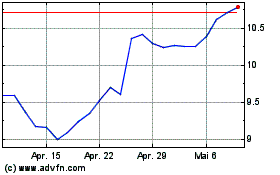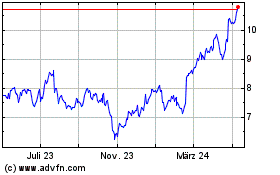U.K. Will Fine Barclays Chief -- WSJ
21 April 2018 - 9:02AM
Dow Jones News
Test of rules holding executives responsible for their actions
lets Staley remain as CEO
By Max Colchester
This article is being republished as part of our daily
reproduction of WSJ.com articles that also appeared in the U.S.
print edition of The Wall Street Journal (April 21, 2018).
Barclays PLC said Chief Executive Jes Staley will keep his job
after British regulators concluded his attempts to unmask a
whistleblower didn't represent a "lack of integrity" and instead
chose to slap the executive with a fine.
The London-based bank said it still backed Mr. Staley, ending a
year of instability for the CEO and drawing a line under a major
unknown that has weighed on Barclays as it looks to push on from a
major restructuring. The case was also the first major test of the
new U.K. "Senior Managers Regime," a set of regulatory rules aimed
at ensuring bank executives are held responsible for their actions.
The U.K. recently bolstered rules to protect whistleblowers.
Barclays had flagged to regulators last year Mr. Staley's
attempts to reveal the identity of a whistleblower who criticized a
hire that the CEO made. Mr. Staley apologised for making the
attempts. The move prompted a yearlong probe and fears among some
investors and staff that the chief executive could be deemed unfit
to run a bank. On Friday, the bank said the U.K.'s Financial
Conduct Authority and Prudential Regulation Authority concluded
that Mr. Staley didn't act "with a lack of integrity or that he
lacks fitness and propriety to continue to perform his role."
However, Mr. Staley does face a fine and Barclays's board has
already said it would dock some of his 2016 pay over the
debacle.
Mr. Staley's total financial penalty could hit seven figures, a
person familiar with the bank said. In a statement, U.K. regulators
said they had "drafted warning notices" related to the CEO and
declined to comment on the size of a fine.
Barclays said it couldn't comment on the outcome of the probe
because Mr. Staley still has the right to challenge the fine. It
said Mr. Staley wasn't available to comment.
The end of the investigation, and the bank's support, clears the
way for Mr. Staley to focus on running the lender, which is
wrestling with a deeper problem: whether its investment bank can
generate strong profits and allay some investors' long-held
concerns that it needs to shrink drastically. That pressure
ratcheted up recently after activist Sherborne Investors Management
LP said it had taken a 5.2% stake in Barclays.
The New York Department of Financial Services is still probing
Mr. Staley and Barclays over the matter, according to a person
familiar with the matter. The probe may result in a fine, but
lawyers say a ban of Mr. Staley is unlikely given U.K. regulators'
support of him.
The investigation into Mr. Staley has proved an awkward
distraction. In the summer of 2016, Mr. Staley twice tried to
identify the source of an anonymous letter to a senior executive
that criticized the hiring of Tim Main, who was named as Barclays's
head of financial institutions group, according to people with
knowledge of the events. That letter also raised questions about
Mr. Staley's dealings with Mr. Main when they worked together at
JPMorgan Chase & Co.
Barclays commissioned its own probe and shared its findings with
U.K. regulators. The bank concluded that Mr. Staley honestly, but
mistakenly, believed that it was permissible to identify the author
of the letter.
Mr. Staley later apologized for his actions and the
whistleblower's identity was never revealed. However, investors
fretted that regulators would deem Mr. Staley unfit to run a major
bank -- an outcome that would have prompted another managerial
shuffle at a lender that has gone through four bosses in five
years.
Mr. Staley's efforts to find the source of the letter came just
as British regulators were tightening protections for
whistleblowers. Regulators had to prove they were acting on the
accusations without destabilizing one of the U.K.'s biggest
banks.
Some industry watchers question whether the watchdogs' decision
to spare Mr. Staley undermines their stated desire to protect
whistleblowers. "The magnitude of banning the sitting CEO of such a
systemically important institution made outcomes other than a fine
unlikely," said Nicholas Querée, a lawyer at Peters & Peters
Solicitors LLP. "The case does set an interesting precedent," he
added, showing executives can use their power to try to unmask a
whistleblower "and remain in a regulated post."
Barclays said a separate probe into how the bank handles
whistleblowing hasn't resulted in an enforcement action but they
will have to make some changes to the way it operates.
In recent years, Barclays has faced a series of regulatory
action. Last month the bank paid pay $2 billion in civil penalties
to resolve U.S. Justice Department claims that the U.K. lender
fraudulently sold mortgage securities that helped fuel the
financial crisis.
Write to Max Colchester at max.colchester@wsj.com
(END) Dow Jones Newswires
April 21, 2018 02:47 ET (06:47 GMT)
Copyright (c) 2018 Dow Jones & Company, Inc.
Barclays (NYSE:BCS)
Historical Stock Chart
Von Mär 2024 bis Apr 2024

Barclays (NYSE:BCS)
Historical Stock Chart
Von Apr 2023 bis Apr 2024
